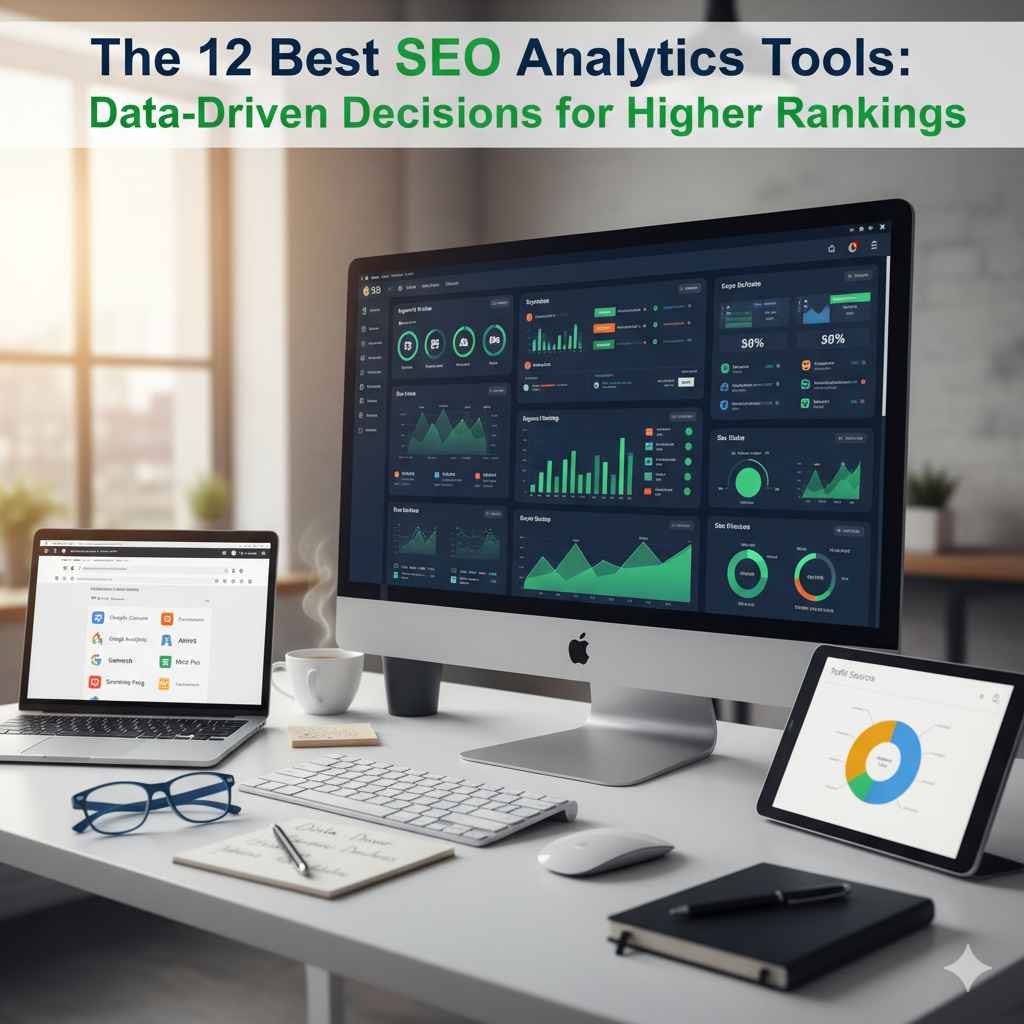How do you know whether the tweaks you make to title tags, page speed, or backlinks are actually moving the needle? If you’re still relying on gut feeling, you’re flying blind. In my first year as a freelance content strategist, I wasted dozens of hours chasing “optimizations” that never showed up in the numbers. Only when I built a reliable analytics stack did my traffic curve finally bend upward.
In this guide, we’ll look at the Best SEO Analytics Tools available today, what each one does well, and how to decide which combination fits your budget and workflow. Expect real-world use cases, pricing notes, and a few pitfalls I learned the hard way.
What Makes a Good SEO Analytics Tool?
- Accurate data collection (organic clicks, impressions, keyword positions)
- Actionable reporting and visualization
- Reasonable learning curve
- Integrations with other marketing platforms
- Transparent pricing and data limits
- Solid customer support and documentation
“Raw data is useless until it can change what you do on Monday morning.” — A mentor’s reminder that still echoes whenever I open a dashboard.
The Best SEO Analytics Tools
1. Google Search Console (Free)
Google Search Console (GSC) is the first stop for most site owners because it tells you how Google itself sees your pages.
- Track impressions, clicks, and average positions for every query
- Inspect individual URLs to diagnose crawl or indexing problems
- Submit XML sitemaps and see coverage reports
- Free up to 16 months of historical data
Personal note: I set up a daily Looker Studio dashboard pulling GSC data so clients can see gains without logging in.
2. Google Analytics 4 (Free)
GA4 isn’t strictly an SEO tool, but pairing behavior data (bounce rate, engagement time) with organic traffic metrics shows which pages deserve your attention.
- Event-based tracking replaces old session metrics
- Path exploration helps uncover post-click behavior
- Built-in “Explore” templates for cohort analysis
- Connects directly to Looker Studio
Tip: Create a segment that includes only Session default channel group = Organic Search to isolate your SEO audience.
3. Ahrefs
Ahrefs has arguably the deepest backlink index and one of the fastest site audits on the market.
- Keyword Explorer covers 10+ search engines, not just Google
- “Content Gap” reveals keywords competitors rank for while you don’t
- Site Audit highlights internal link opportunities and broken pages
- Pricing starts at $99/month (7-day trial for $7)
If link building is mission-critical, make room in your budget for Ahrefs.
4. Semrush
Semrush straddles SEO, PPC, and content marketing with a toolbox of 50+ mini-apps.
- Position Tracking refreshes daily for granular SERP movements
- On-Page SEO Checker pairs audit data with specific recommendations
- “Keyword Magic” holds 20B keywords and question variations
- Social media poster and brand-monitoring add-ons included
I reach for Semrush when clients need a single login for SEO research and paid search planning.
5. Moz Pro
Moz Pro remains a favorite among small agencies for its clean interface and helpful metrics.
- Domain Authority (DA) and Page Authority (PA) indicators
- Link Explorer with spam score detection
- Fresh web index updates every 24 hours
- Free MozBar Chrome extension for quick SERP analysis
Drawback: The keyword database isn’t as vast as Ahrefs or Semrush, but beginners appreciate the straightforward UI.
6. Screaming Frog SEO Spider
Screaming Frog is a desktop crawler that behaves like Googlebot on caffeine.
- Crawl up to 500 URLs free, unlimited with paid license (£199/year)
- Identify duplicate content, redirect chains, and missing alt text
- Integrates with GSC, GA4, and PageSpeed Insights APIs
- Custom extraction for metadata, schema, and hreflang tags
Because the data lives on your machine, audits run faster than many cloud tools.
7. SE Ranking
SE Ranking delivers enterprise-level rank tracking at SMB pricing.
- Accurate daily keyword rank updates across locations and devices
- On-page checker scores individual URLs
- Competitive research for Google Ads and organic keywords
- Plans from $44/month, billed by the number of keywords
It’s simple reporting templates are a lifesaver when a client asks, “Can I have that by end of day?”
8. Matomo (Formerly Piwik)
For privacy-focused organizations, Matomo is an open-source alternative to GA4.
- You own 100 % of the data (on-premise or cloud)
- No sampling—every hit is recorded
- Heatmaps, session recordings, and form analytics add-ons
- GDPR-ready without additional consent banners
Self-hosting does require server resources, so budget both time and infrastructure.
9. SERPstat
SERPstat packs rank tracking, site audits, and PPC research into one platform.
- “Batch Analysis” compares up to 200 domains side by side
- Tree view visualizes site structure and thin content areas
- Keywords trends tool identifies seasonal search spikes
- Lifetime deals occasionally appear on AppSumo (worth watching)
Ideal for entrepreneurs managing multiple micro-sites.
10. Sitebulb
Sitebulb turns technical SEO audits into visual storytelling.
- Crawl maps highlight orphan pages and silo issues
- Hints system ranks issues by potential impact
- JavaScript rendering to mimic modern web apps
- Desktop license: $13.50/month (Lite) or $35 (Pro)
I often pair Sitebulb with Screaming Frog: crawl with Sitebulb for visuals, export URLs to Frog for custom extraction.
11. Looker Studio (Free)
Looker Studio (née Data Studio) isn’t a data source but a powerful dashboard layer.
- Native connectors for GSC, GA4, BigQuery
- Community connectors for Ahrefs, Semrush, and more
- Blend data (e.g., combine organic sessions with revenue)
- Share live links or scheduled PDFs with stakeholders
Quick win: Build a blended chart that shows GSC click data alongside Ahrefs keyword difficulty so you can spot low-hanging fruit.
12. JetOctopus
JetOctopus is a cloud crawler built for speed—think millions of URLs per hour.
- Integrates log-file analysis to compare real Googlebot hits vs. crawl budget
- JavaScript rendering available without desktop resources
- Pricing based on crawl credits, starting at $45/month
- API and BigQuery export for large enterprises
Perfect for e-commerce sites battling duplicate parameter URLs and faceted navigation.
How to Choose the Right Mix
- Define your primary goal
- Technical cleanup → Screaming Frog, Sitebulb
- Link acquisition → Ahrefs, Moz Pro
- Content strategy → Semrush, SERPstat
- Sketch your budget
- Under $100/month? Combine free Google tools with a low-tier rank tracker.
- Agency plan? Layer Ahrefs or Semrush with a crawler and Looker Studio.
- Consider learning curve and team size
- Solo operators often favor simpler dashboards.
- Larger teams may need role-based access and API endpoints.
- Test before committing
- Most paid platforms offer a trial or money-back window.
- Run the same audit across tools to compare findings.
Tips for Getting the Most Out of SEO Analytics Tools
- Set up automated alerts (e.g., position drops > 5 spots) to respond quickly.
- Tag URLs by content type so you can segment blog posts, product pages, etc.
- Export raw data monthly and store it—many tools hold only 16–24 months.
- Create a “north star” KPI (organic revenue, leads, or sign-ups) and map every metric back to it.
Internal resource: Check our step-by-step guide to creating an SEO measurement plan.
Conclusion
Choosing the Best SEO Analytics Tools isn’t about grabbing the most expensive software; it’s about matching the right data to the questions you need answered. Start with free staples like Google Search Console and GA4, then layer specialized tools—whether that’s Ahrefs for backlinks, Semrush for all-in-one research, or Sitebulb for technical deep dives.
Remember, tools don’t improve rankings by themselves—consistent analysis and action do. So pick one new insight from today’s article, set up a dashboard, and let the data guide your next Monday morning task list. Happy optimizing!





